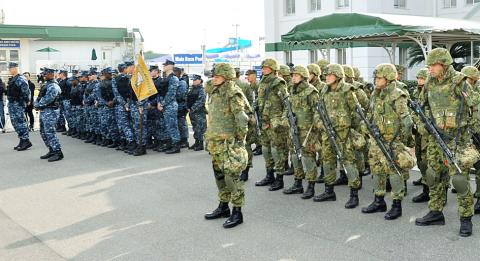Japan and the US launched their biggest ever joint military exercise yesterday in a strident display of firepower featuring tens of thousands of personnel, hundreds of aircraft and 60 warships.
The “Keen Sword” drills were planned before North Korea’s deadly artillery barrage of a South Korean island last week, but come just days after the US and South Korea conducted smaller exercises aimed at deterring Pyongyang.
The drills are being held to mark the 50th anniversary of the Japanese-US alliance, Japanese defense ministry officials said, and last until Friday next week.

Photo: Reuters
The Pacific allies are for the first time being joined by South Korean military observers, in a bid by Tokyo to demonstrate solidarity among the three countries at a time of high tension in the region.
The massive exercise features about 44,000 military personnel, 60 warships and 400 aircraft from both sides in a drill off Japan’s southern islands, close to the coast of South Korea and in the Sea of Japan.
The US nuclear-powered George Washington aircraft carrier, which also took part in the US-South Korean exercises, joined Japan’s Aegis missile-equipped destroyers and F-15 jet fighters as heavy wind and rain lashed the first day. The joint drills will be much bigger than the naval exercise staged by Washington and Seoul.
Japan, which relies heavily on the US for its security under its pacifist constitution, has been on high alert since the attack.
China’s newly assertive posture on territorial issues this year has also been a cause for concern for Tokyo and other Asian nations, in a region where Washington is seen as an important counterbalance.
The maneuvers include integrated air and missile defense, base security, close air support, live-fire training, maritime defense and search and rescue.
The inclusion of South Korean observers follows Japan’s sending of observers to joint US-South Korean military exercises in July, held after the sinking of the South Korean Cheonan naval vessel.
An international investigation blamed North Korea for the sinking, which left 46 South Korean sailors dead. Beijing has hit back at the military maneuvers, which it sees as taking place in its backyard, -saying to talk with the nuclear-armed regime is better than to “brandish weapons.”
China complained it was being unfairly criticized for urging dialogue and suggested talks with the North would be more helpful than military exercises, as South Korea also readied for new live-fire drills next week.

DEFENDING DEMOCRACY: Taiwan shares the same values as those that fought in WWII, and nations must unite to halt the expansion of a new authoritarian bloc, Lai said The government yesterday held a commemoration ceremony for Victory in Europe (V-E) Day, joining the rest of the world for the first time to mark the anniversary of the end of World War II in Europe. Taiwan honoring V-E Day signifies “our growing connections with the international community,” President William Lai (賴清德) said at a reception in Taipei on the 80th anniversary of V-E Day. One of the major lessons of World War II is that “authoritarianism and aggression lead only to slaughter, tragedy and greater inequality,” Lai said. Even more importantly, the war also taught people that “those who cherish peace cannot

STEADFAST FRIEND: The bills encourage increased Taiwan-US engagement and address China’s distortion of UN Resolution 2758 to isolate Taiwan internationally The Presidential Office yesterday thanked the US House of Representatives for unanimously passing two Taiwan-related bills highlighting its solid support for Taiwan’s democracy and global participation, and for deepening bilateral relations. One of the bills, the Taiwan Assurance Implementation Act, requires the US Department of State to periodically review its guidelines for engagement with Taiwan, and report to the US Congress on the guidelines and plans to lift self-imposed limitations on US-Taiwan engagement. The other bill is the Taiwan International Solidarity Act, which clarifies that UN Resolution 2758 does not address the issue of the representation of Taiwan or its people in

US Indo-Pacific Commander Admiral Samuel Paparo on Friday expressed concern over the rate at which China is diversifying its military exercises, the Financial Times (FT) reported on Saturday. “The rates of change on the depth and breadth of their exercises is the one non-linear effect that I’ve seen in the last year that wakes me up at night or keeps me up at night,” Paparo was quoted by FT as saying while attending the annual Sedona Forum at the McCain Institute in Arizona. Paparo also expressed concern over the speed with which China was expanding its military. While the US

‘FALLACY’: Xi’s assertions that Taiwan was given to the PRC after WWII confused right and wrong, and were contrary to the facts, the Ministry of Foreign Affairs said The Ministry of Foreign Affairs yesterday called Chinese President Xi Jinping’s (習近平) claim that China historically has sovereignty over Taiwan “deceptive” and “contrary to the facts.” In an article published on Wednesday in the Russian state-run Rossiyskaya Gazeta, Xi said that this year not only marks 80 years since the end of World War II and the founding of the UN, but also “Taiwan’s restoration to China.” “A series of instruments with legal effect under international law, including the Cairo Declaration and the Potsdam Declaration have affirmed China’s sovereignty over Taiwan,” Xi wrote. “The historical and legal fact” of these documents, as well